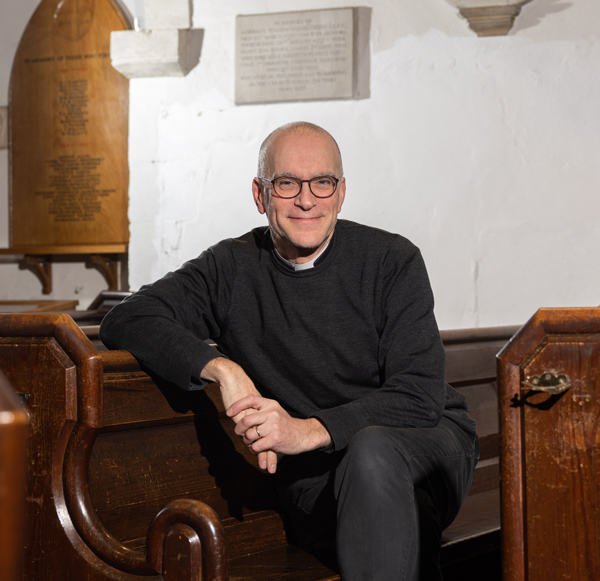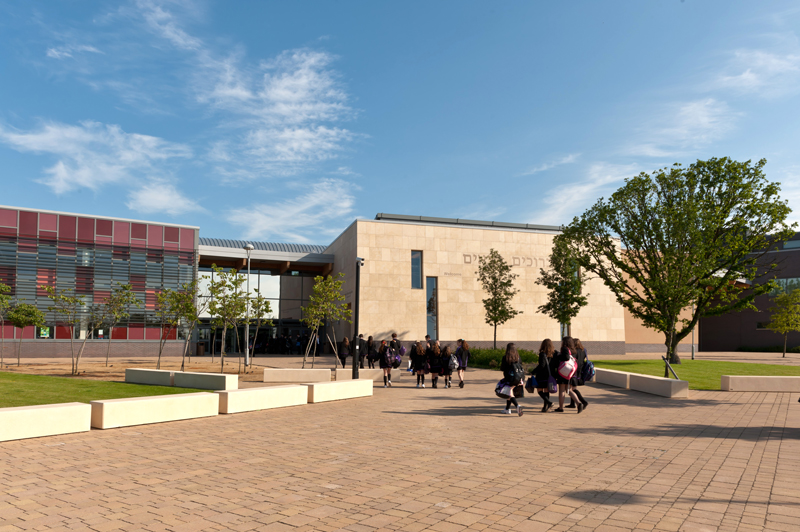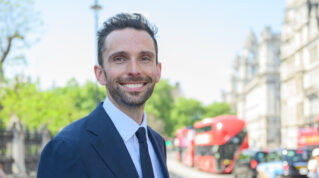Why does an Anglican priest want to open a vocational Jewish sixth-form college? Jessica Hill finds out...
Patrick Moriarty is, he admits, “a bit messianic” in his quest to set up the first faith-based T-levels centre in the country.
His plan is to cater for the Jewish community in Barnet, north London, where until December he spent 13 years as deputy head and head of the country’s first and only cross-denominational Jewish community secondary school (JCoSS).
But what makes Moriarty’s mission somewhat perplexing is that he is an ordained Anglican priest – and one clearly not afraid to court controversy.
Moriarty fought for JSoCC’s community all the way to Downing St during a Covid spike in December 2020, when he found himself in a stand-off over his decision to shut the school.
With the blessing of governors, he had announced the closure for the last three-and-a-half days of term, with coaches and catering activities duly cancelled.
When the regional schools commissioner ordered him to stay open, Moriarty “pushed back”, reminding them that as a voluntary aided school they lacked jurisdiction to direct JCoSS.
“That was the uncovering of the steel within me that said ‘no. If you’re going to start making me follow a process, you’re going to have to as well’,” he recalls. “Closing was in the best interests not only of the school but the community we serve. That’s a really important part of a school like this, which has a sense of connectedness from one Jewish community to another.”
Moriarty’s rebellion was escalated to then schools minister Nick Gibb. While this was done with “protocol and courtesy”, there is, he says, “sufficient institutional menace [applied] when your school community is under attack.”
I want to make technical and vocational education sexy
That week several other London schools also rebelled against government orders to remain open, but JCoSS became “almost the last school standing”. Then transport minister Grant Shapps, who had children at JCoSS, and local MP Therese Villiers both indicated some support for its predicament.
Moriarty found himself in an online meeting with Downing St officials, education special advisers, Barnet Council (who were supportive of his stance), school commissioners and the head of the Partnership for Jewish schools (PaJeS).
“Why in the middle of this horrific pandemic could they spare an hour to go for one school trying to do the right thing? Somebody had lost perspective here, and it wasn’t me. We had become a totem of the government’s determination to see its will done.”
In the end, a deal was struck in which “nobody lost face”. The school remained open for parents who registered interest, although no one did.
Moriarty made some important self-discoveries throughout the episode. “If you want to really get my goat, attack my values. I had a sense of ‘this is my community, don’t mess with it’.”
It is the same fiery conviction that is now leading him to help the less academic Jewish pupils he feels are being let down by the education system.
“I’ve watched some of the most wonderful, vulnerable members of the school community, often with special educational needs, having to leave at the age of 16 – sometimes for the first time going into education outside the Jewish community – and it’s a real shock to their systems,” he says. “I know this from some really painful cases. They feel it as a personal rejection by the school and community. They feel that ‘just because I don’t want to be a doctor, lawyer or accountant, you’re turning your back on me’. That never felt right to me.
“There is a sector of people for whom university is not the right thing, so let’s provide an attractive alternative… I want to make technical and vocational education sexy, and at the moment it’s not.”
Moriarty is driven not just by a “mixture of social justice and educational integrity”, but also “an eye on what the economy needs”. He believes the qualifications have “huge cross-party support, and political capital and financial capital” behind them, and that a Jewish T-levels centre would be “well placed” to forge partnerships with employers.
He says the current value placed on academia was not shared by previous generations of Jewish migrants.

At JCoSS’s annual “grandparents’ day”, older members of what used to be a more “mobile” Jewish community recite stories of how they “left school at 14 to work as taxi drivers or in the rag trade”.
“Why are we now saying ‘actually, only the professions will do?’ That bothers me,” Moriarty says.
He doesn’t think most Jewish schools individually have the numbers to make post-16 level two courses sustainable. But he claims there are enough such students in Barnet to make his proposed Jewish Vocational Sixth Form College – or JV6 as he calls it – viable.
It would specialise in “white collar vocational” subjects such as media, health and social care, digital and business.
Moriarty is now undertaking a feasibility study, after which he will submit a bid to the Department for Education to open a 16 to 19 free school offering T-levels.
The government launched the new qualifications in 2020, with 23 courses set to be rolled out by 2024 – the year Moriarty hopes to launch his venture from JCoSS. Students would then be transferred to new facilities, most likely elsewhere in Barnet, the following year.
Moriarty believes the Jewish community’s “cohesion, demography and employment patterns” make it “brilliantly placed to make T-levels work.
“After all, Israel is an absolute powerhouse for technological innovation and Jewish communities have the ability to draw on that.”
Moriarty claims to have the backing of Barnet Council as well as “huge support” from the Jewish community, including £180,000 from two philanthropic trusts.
But big questions remain, including how the Jewish ethos of the centre should be determined. “Some [students] want full-blooded Jewish textual-based education, because they’ve been doing two hours of study of the Talmud every morning and it’s important to them to carry on with it. How do we fit that with people for whom their Jewish identity is important, but they don’t want to study it? And to get all that to cohere in one institution?”

Moriarty had to answer similar quandaries when he joined the “ground-breaking” JCoSS as deputy head in 2010 – the first Jewish school catering for all the main denominations, rather than being led by any one.
It was then just “a website and a building site”, and he and his team were writing “a curriculum from scratch”.
Having spent the previous 12 “incredibly enriching and enlightening” years at Haberdashers’ girls independent school in Elstree as head of sixth form, he vowed to “lift whatever I could of that school’s powerful, enabling ethos and replant it at JCoSS”.
Moriarty at first expected it to be a “different demographic” to Haberdashers and as a maintained school, “much tighter in its management structures with less freedom”. But he found its aspirational north London families not so different, and the management lines of accountability “just the same thing [as in other schools], labelled in a different way”.
When the headship came up in 2017 at the same time Moriarty was accepted for training as a priest, he asked the governors if they would “not rather have a Jewish headteacher”.
“They told me they were more interested in having the right person for the job, even if it’s the wrong religion, than the wrong person and the right religion. Jewish schools are very pragmatic about these things.”.
I really like being an insider-outsider in the community
He says a minority of the heads of Jewish secondary schools are Jewish – although he is the only one also an ordained priest.
This is he claims “not as weird as it might sound” because “the headteacher is the CEO who does admin and general leadership, then there’s a rabbi or team of Jewish educators who do the Jewish bit”.
Moriarty says preparing for his Sunday morning sermons helped him to be a better head because it forced him to sit and think “very, very hard” for two hours, with his Christian sermons sometimes overlapping with content for his school assemblies.
“With a bit of tweaking, I could sometimes get final assembly, the newsletter to parents and the parish newsletter and sermon all from the same material – if, for instance, it was about the importance of the prophetic voice, treading a path between justice and mercy, or how we respond to consumerism. These are universal moral issues.”
Moriarty also sees priesthood as his ‘vocation’ – which to him means “having a sense of calling, a tug that takes you towards making the world a better place”.
And if the plan doesn’t come off? There is a twinkle in his eyes as he suggests he could set up a Christian T-levels centre instead.
But, as a priest, why not just do that in the first place?
“I want to start with the community that I know and understand… I really like being an insider-outsider in the community. On some psychological level, something in me responds to it.”
His dream is to set up a college that has “the kudos of university”; that, when the community are “sat around the Shabbat table talking about what their children are doing, they can say ‘well, my child is at Jewish vocational college’. I want them to feel proud of that.”














Your thoughts